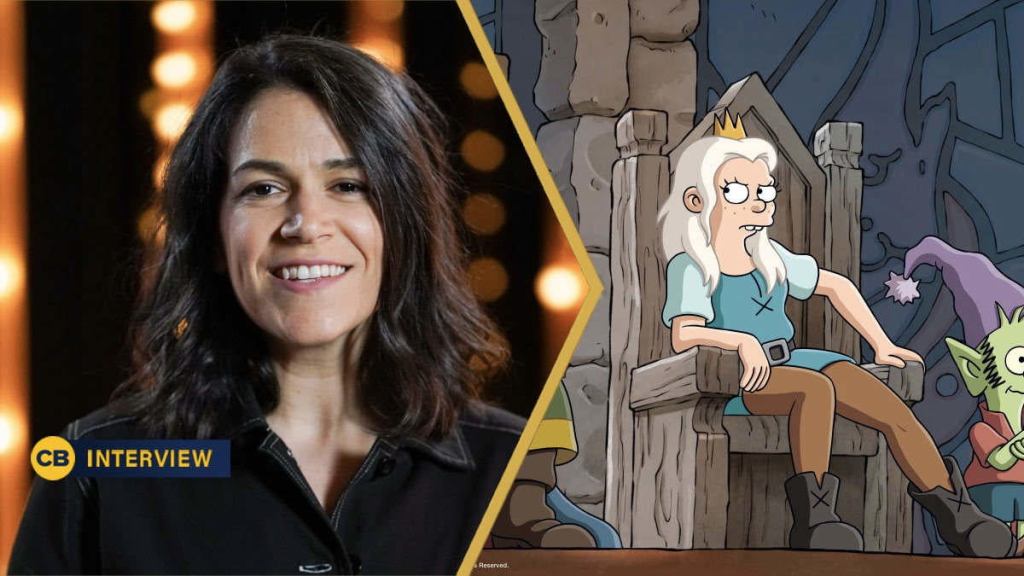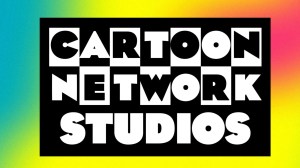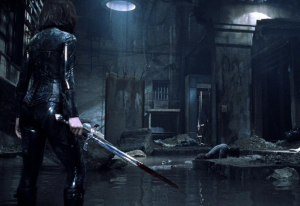Disenchantment: Part Four, sending Bean and her companions Luci and Elfo on another adventure. The series hails from Matt Groening, creator of The Simpsons and co-creator of Futurama (which is set for a revival on rival streamer Hulu). And yet, unlike those shows, Disenchantment tells a serialized story as Bean and her friends grow and change along with the world around them from episode to episode. At the end of Disenchantment: Part 3, the once responsibility-averse Princess Bean was the queen of Dreamland but found herself taking an unexpected trip to Hell where her scheming mother waited.
Videos by ComicBook.com
Abbi Jacobson, the comedian/actress/writer best known for co-creating and starring in Broad City, voices Bean. Ahead of the Disenchantment: Part Four‘s debut, ComicBook.com had the chance to talk to her about Disenchantment‘s unexpected serialized storytelling, growing alongside her character, and more. Here’s what she had to say:

Bean’s has been through a lot of the first three parts of the show, and now four is here. What would you say is the big theme or the big challenge for Bean this time?
Abbi Jacobson: Aye yi yi. What is the big challenge for Bean this season? I mean, I feel like it’s just like a… I don’t know if I know how to quite sum it up. I think that she more and more is getting to know who she really is, and there’s a struggle with that, a struggle and acceptance when you really start to hone in on who you really are and figuring all that out. I think they do a really good job every season of propelling Bean into this hero’s journey, but I think this season more than the rest, they’ve really had her find herself without the other two, without Luci and Elfo for a while, and trying to find them again, and herself. I don’t know if that’s an answer, but I think that’s how I would sum it up broadly.
As Bean finds herself more and more, has that affected the way you approach the character when you’re giving your performance?
I don’t know if it’s been that different, just as much as if you voice a character for this long, I’ve been working on this since 2017, I’m changing with the character, so you can’t help but grow and change with them a little bit, It’s also this was and still is a huge gig for me. When I got it, I was so over the moon about this job, and still am, but I think in the beginning, there was way more nerves, and now I feel more confident with her if that makes sense.
I know some actors, they try to find something they see that reminds them of themself and the character to latch onto that. Has that been something that you’ve done, and has it become more or less difficult as, as you’ve said, both you and the character have changed over the years?
I think in the beginning I was like, “What do we have in common?” Because she’s living in this medieval kingdom, and she’s this princess and drinks a ton of beer, and is more of a smart-ass than I think I would ever let myself be in real life. But I do feel like the scrappiness to her and that seeking, searching vibe is very similar between us, but I do think as they’ve grown the character, Bean’s finding her sexuality and that part of herself, is something that was not really there in the show in the beginning. So that started to lean toward me in a way that I was like, “Wow, we do have some similarities,” and figuring that out a little later in life.
I also relate to, and I think, any adult that’s looking at themselves, my parents are nothing like Bean’s parents, but I think you can’t help but be like, “What happened as a kid to me?” or “What was my childhood like? What were my parents like, and how did they influence me?” I think that’s a lot of what Bean is doing too. Her relationship with her parents is a pivotal part in her figuring herself out, and I think anyone that has dabbled in therapy knows that that’s ripe for the picking there.
That part. That’s the way it goes. I definitely feel that seeking, searching part of her, and finding your people. I think that Elfo and Luci are Bean’s chosen friends and found family, and I think that that’s such a… I really relate to that part the unexpected people that you come across that are essential.
It’s interesting to me that we can talk this much about character growth regarding a Matt Groening animated comedy because these shows are mostly thought of almost as being gag strip kinds of shows. How does what you’ve done on Disenchantment compare to what you expected when you signed for a Matt Groening animated comedy?
I definitely thought what you said. The serialized narrative, I don’t think you normally think of a lot of animated shows, I think in the past maybe five or eight years, that’s sort of like the new trend. Not the new trend, but a new thing that animated series allow themselves to do, to get serialized. I did not think that this would be serialized. I thought this would be way more episodic, way more like The Simpsons, where you do not need to watch this in order to fully comprehend what’s going on. You can kind of pop in and out, you know? So that has been so cool to watch and cool to be a part of. It feels really different for an animated show, even though I think a couple of others are doing that too. I know it’s a really difficult challenge to do that in the animated space, I think.
Coming at it as someone who’s an actor and a comedian, do you find it more fulfilling this way, that you’re playing a character that changes over time, or is the gag-focused, episodic stuff more comfort zone?
I really enjoy both. On Broad City, in the first three seasons, I think we operated in more of an episodic space where you could just pop in, but then it became clear that we wanted the characters to grow and change and explore that. There is something, while it’s like, listen, you want the audience to laugh, but when it’s rooted in character, which I think inevitably requires growth and real character development, then I think that laugh has a little bit more quality in it or something. It’s a more guttural laugh that you’re laughing, because you understand this person more, or understand this… I don’t know if that makes sense. It feels a little bit more earned or something.
When you decided to go into show business, was voice-acting something you were eager to get into?
I think a little. I never, as a kid was like, “That’s a thing that you could even do.” I really didn’t even know. To me, this seemed like all of the things, I’m like, “You can’t grow up and do that. You can’t be an actor.” I didn’t know anyone that did anything in this industry, so all of it, it seemed very out of this world to go into the business in any way. Then once I started doing comedy, again, the voiceover stuff wasn’t something I even necessarily thought, like, “Well, how do you do that?”
I sort of stumbled into it first because I got a commercial agent first and I was way more successful. Not very successful, but I booked one commercial where I did a voiceover, and then I realized that I guess I have a voice that sounds very — I kind of sound like a kid sometimes. Obviously. I keep playing kids in movies, or in voiceover, in animations. I don’t know. Then I was like, “Wow, I really love doing this,” and fell into it once it was pointed out to me if that makes sense. I would never have gone after that first.
It took somebody saying, “This might be a thing that you’re actually pretty good at” for you to realize, more or less?
It was like, the commercial agent got me an audition for a voiceover for a commercial, and I got it, and then I was like, “Oh, okay. That was great. Let’s do that more. It’s so fun.” And then the animation stuff, I think my first thing was a voice on this show, Pickle and Peanut, but yeah, it was just getting sent the auditions. It was never something that took the reins of in the beginning. Now, I do. Now, I’m very much actively like, “Hey, let’s go after this,” because it’s such a fun world to be in.
What about the fantasy aspect of it? Are you someone who grew up very into like sci-fi/fantasy stuff, or were you approaching this entirely from the comedy angle?
I think more from the comedy angle for me. It’s not like I don’t like sci-fi. I think that it really depends on what it was, but I think I definitely am more rooted in grounded, not that sci-fi is not grounded, but I don’t know if as a kid if I was watching a lot of sci-fi or reading a lot of sci-fi. I think maybe I am more now, and that might be just because our actual reality is science fiction constantly, so I’m like, “What? What else?” You know? It’s sort of a later thing that I’ve become more interested in sci-fi, but no, the comedy of this, I think, is first and foremost for me.
We talked a bit about Bean’s journey and how this is a serialized story. Do you have a sense of how far along that journey is, how far you think is still to go before reaching a conclusion?
I don’t know, but I know they do a really good job of ending everything on cliffhangers and really making you want more, and find out more about the characters and what’s going to happen next. That said, I think each season you come away with so much more about the characters, and there’s so much that’s happened that I think there’s definitely so much more to be told. I don’t have an idea, but I think there’s a lot more story to be told.
Disenchantment: Part Four is streaming now on Netflix.








